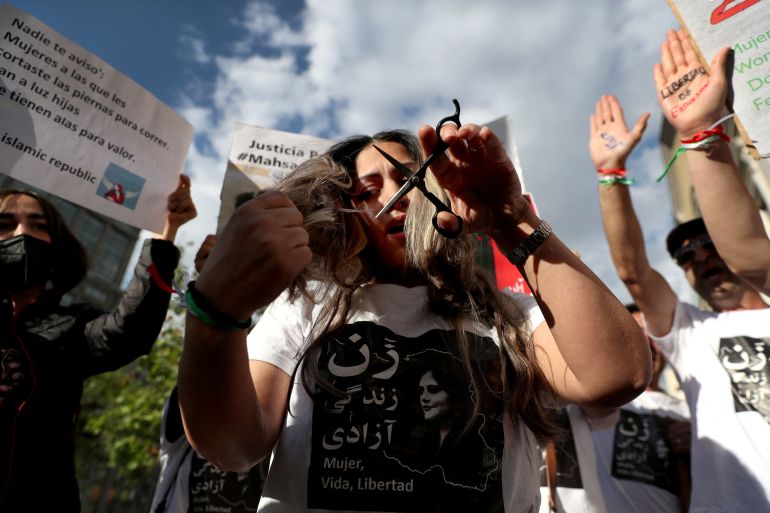‘Not afraid anymore’: Iran protests enter fourth week
Workers went on strike and street clashes erupted across the country over the death of Mahsa Amini in police custody.

Schoolgirls chanted slogans, workers went on strike and street clashes erupted across Iran as protests over the death of Mahsa Amini entered a fourth week in defiance of a bloody crackdown.
Anger flared after the 22-year-old Iranian-Kurd’s death on September 16, three days after she was arrested by “morality police” for an alleged breach of Iran’s strict dress code for women.
Keep reading
list of 4 itemsIran organises more counter-demonstrations as protests continue
Hajj pilgrim arrested by Saudi Arabia returns to Iran
Detained Iranian American Baquer Namazi leaves Iran for Oman
An investigation found Amini died of a longstanding illness rather than “blows” to the head, Iran said on Friday, despite her family reportedly saying she had previously been healthy.
But the protests continued on Saturday even as President Ebrahim Raisi posed for a group photograph with students at Tehran’s all-female Al-Zahra University to mark the new academic year.
The government has described the protests as a plot by Iran’s enemies including the United States, accusing armed dissidents – among others – of violence in which at least 20 members of the security forces have been reported killed.
Raisi addressed professors and students. “They imagine they can achieve their evil goals in universities,” state TV reported. “Unbeknownst to them, our students and professors are alert and will not allow the enemy to realise their evil goals.”
In Amini’s hometown Saqez, in the western province of Kurdistan, schoolgirls were heard chanting “Woman, life, freedom” and seen marching down a street swinging headscarves over their heads, in videos the Hengaw rights group said were recorded on Saturday.
In another video it shared, a group of girls could be heard chanting the same phrase as they entered a school in Sanandaj, the capital of Kurdistan province.
Gruesome videos were widely shared on Twitter of a man who appeared to have been killed while sitting at the wheel of his car in Sanandaj, where gunfire was heard in other footage.
A police official said security forces did not use live rounds and the man was killed by “counter-revolutionaries”, the state news agency IRNA reported.
Iran’s semi-official news agencies played down the protests across the capital Tehran. The ISNA agency reported “limited” demonstrations in about 10 areas of the city and said many Bazaar traders had shut their shops for fear of damage caused by the unrest, denying there was a strike.
‘Widespread strikes’
Despite internet restrictions designed to impede gatherings and prevent images of the crackdown from getting out, protesters have adopted new tactics to get their message across.
“We are not afraid anymore. We will fight,” said a large banner placed on an overpass of the Modares highway that cuts through central Tehran.
Hengaw, a Norway-based Kurdish rights group, said “widespread strikes” were taking place in Saqez, Sanandaj and Divandarreh, in Kurdistan province, as well as Mahabad in West Azerbaijan province.
The 1500tasvir social media channel said there were protests in the southern city of Shiraz, while the London-based Iran Wire news website said students also skipped class to demonstrate in Isfahan and Tabriz.
Dozens of people have reportedly died during the month of demonstrations. Raisi has appealed for unity.
“Despite all the efforts of ill-wishers, the strong and hardworking people of Islamic Iran will overcome the problems ahead with unity and cohesion,” he was quoted as saying Saturday on the presidency’s website.
Arbitrary detentions
Iran has repeatedly accused outside forces of stirring up the protests, and last week announced that nine foreign nationals – including from France, Germany, Italy, Poland and the Netherlands – had been arrested.
On Friday, the French government advised its nationals visiting Iran to “leave the country as soon as possible”, citing the risk of arbitrary detention.
The Dutch government advised its citizens to avoid travelling to Iran or to leave when they can do so safely.
“In many towns in the country there may be demonstrations which can turn violent,” it said. “The police sometimes act harshly … Iranian authorities can also arbitrarily detain people with a foreign nationality.”
Nazanin Zaghari-Ratcliffe, a British-Iranian charity worker who was held in Tehran for six years until her release in March, called on the UK government to act over Iran’s rights abuses.
“I want the [UK government] to observe what is happening, not to turn a blind eye. I want them to protect us. We cannot be indifferent about what is happening in Iran,” she told Sky News.
“And if we talk about protecting the rights of our citizens, we have to do something about it. And I think we have to hold Iran accountable.”